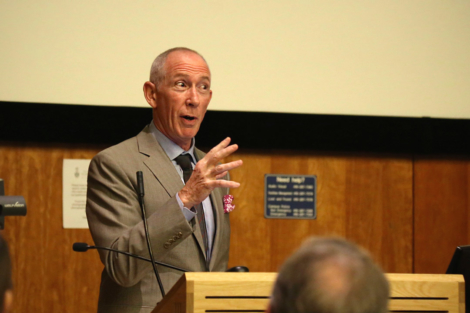Intentional design flaw reflects ableist ignorance
Re: “$30 price tag for writing surfaces in lecture hall stirs controversy at Architecture & Visual Studies town hall”
It is appalling and absurd that the Faculty of Architecture, Landscape, and Design (FALD) intentionally designed a lecture hall without writing surfaces. It seems like the FALD is trying to make the lives of students more difficult.
Dean Sommers asserted that the decision to exclude writing surfaces was, in part, because it provides pedagogical value by discouraging students from using their laptops during lectures. He ignores the fact that a laptop, by definition, can be used on one’s lap without a surface.
Professor Jeannie Kim seemed to reiterate this pedagogical value excuse, claiming that it is better to take notes by hand. She ignores the fact that taking notes by hand is a lot easier when there is actually a surface to write on.
The pedagogical value excuse used by the FALD is laughable, and once again exemplifies the ableism embodied in the university’s mindset. Many students struggle to keep up with the pace of lectures as it is, and not everyone is an expert at shorthand. Some students may have a disability that requires the use of a laptop. A student’s level of dependence on technology does not, and should not, reflect on their academic abilities.
Adding insult to injury, the FALD opted to sell lap desks instead of offering a rental program, showing a blatant disregard for the inequitable economic context of student life.
Ultimately, the dean chose chair stackability over the best interest of students.
Madeleine Kelly is a fifth-year Ethics, Society, and Law and Environmental Studies student at New College.
Development comes at the monumental expense of equality — and it shouldn’t
Re: “‘Development or Justice?’: Jeremy Adelman speaks at annual UTSC Al Berry lecture”

Adelman is a professor at Princeton University. SHANNA HUNTER/THE VARSITY
Jeremy Adelman’s recent remarks at the sixth annual Al Berry lecture are now, more than ever, essential to keep in mind. Speaking about the unequal distribution of wealth, Adelman pointed out that the current drive for international development may further divide the global community.
With increasing nativist and nationalist movements at home and abroad, Canadians must remember that to consider ourselves a nation that truly stands for equality, we must care to leave no one behind. While traditional forms of global divide, such as colonialism, have been gradually disrupted, the innate competitiveness of capitalism has quickly replaced tangible partitions with less visible ones.
The development of one group inevitably comes at the vast expense of the other. Neocolonialism, especially at the hands of international fiscal institutions, tends to put non-western countries at severe disadvantages. As Adelman describes it, development is simply a “new form of empire” that serves to divide the globe into its northern and southern hemispheres.
Reconciliation with Canada’s past must also play a part in lessening the divide. The liberal Canadian government tends to focus on the more social aspects of reconciling with our painful history of colonization. However, it seems to forget that the western model of development is not a universal one. The traditional drive for profitable trade has seen Indigenous peoples all over the globe being “excluded from their land that was made valuable to the public.” This lack of integration is seen all too well in First Nations reserves, where over 80 per cent have a median income below the poverty line.
To settle this global crisis, countries must look beyond their local interests and ensure the redistribution of wealth across and inside their borders. This work begins with education. Adelman aims “to keep the global horizons open and to teach that to students” at Princeton. U of T and other Canadian universities would do well to adopt those principles of teaching in their classrooms.
Ori Gilboa is a first-year Humanities student at Victoria College.
U of T’s current disclosure policy regarding student-professor relationships is sufficient
Re: “What are U of T’s policies on student-professor relationships?”

TIAN ZHENG/THE VARSITY
Discussion surrounding student-professor relationships has never crossed my mind, as I have always just assumed that they were not allowed — at U of T or at any university. However, while examining student-professor relationships at face value may indicate inappropriateness, we do need to remember that university students are in fact adults and may choose to have a relationship with any other consenting adult.
The student-professor dynamic does spark the issue of having a conflict of interest, such as the professor giving the student an unfair advantage in comparison to the rest of their students. There are also more extreme cases that raise questions, such as the case of the UBC student who accused her professor of sexual assault. He has denied this allegation although he did admit to having an affair with said student.
Nonetheless, U of T’s current policy of requiring professors to disclose their relationship to the chair of their department seems to be sufficient without being too constrictive. Consenting adults should be able to be in relationships with whomever they choose. In cases where sexual assault come into play, investigations and punishments concerning that case should be handled appropriately. These particular cases should not be the sole influence on whether or not students may be in relationships with their professors though.
With any relationship, when sexual assault or any form of abuse occurs, it should be addressed appropriately by the authorities. As long as student-professor relationships are consensual and are disclosed, I do not find any immediate issue with the matter.
Areej Rodrigo is a fourth-year English, Professional Writing and Communications, and Theatre and Performance student at St. Michael’s College.


